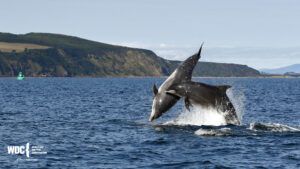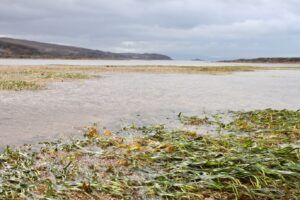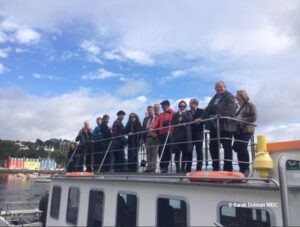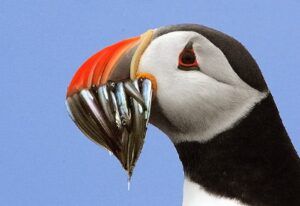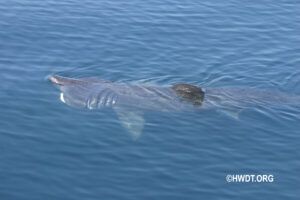Beach litter is on the rise on Scotland’s coastline, according to the results of the Marine Conservation Society Great British Beach Clean 2017 launched today. This year beach litter rose by 7% compared to 2016, with items classed as ‘on the go’ making up 17% of all litter found on beaches. MCS Sea Champion volunteer Jasmin Manning takes us through her top tips to reduce the use of single use plastics.
Category:
A Permanent Plastic Challenge
November 30th, 2017 by emilieHow are Scotland’s bottlenose dolphins doing?
October 13th, 2017 by emilieGuest blogger Sarah Dolman, Policy Manager at Whale and Dolphin Conservation, and Save Scottish Seas campaign member takes a look at how Scotland’s incredible bottlenose dolphins are faring in our ever busier seas.
Seagrass Meadows & Scotland’s Natural Capital
September 28th, 2017 by emilieGuest blogger Richard Lilley from Scottish Seagrass takes us underwater to explore Scotland’s Seagrass Meadows – productive coastal habitats that are an example of the valuable Natural Capital in Scotland’s Seas – and how you can get Seagrass Spotting to help map them!
Members of Scottish Parliament celebrate Scotland’s marine life
September 15th, 2017 by emilieEarlier this month, Save Scottish Seas campaign members took the Environment, Climate Change and Land Reform Committee to experience some of Scotland’s amazing marine life, and showcase Scotland’s Marine Protected Areas (MPAs). (more…)
What news for our seas in the Programme for Government?
September 15th, 2017 by emilieScottish Government recently announced their Programme for Scotland for the next year. With the government committed to reaching the Aichi target to halt biodiversity loss by 2020, and developing a network of coherent Marine Protected Areas (MPA), we expect this to be a busy year to keep Scotland on track. There were many welcome commitments this week, including the long-hoped-for commitment to introduce a Deposit Return Scheme for drinks containers, as well as commitments to increase protection for Priority Marine Features outside of MPAs, evaluate options for a deep sea marine reserve and develop a programme of research on blue carbon stores.
(more…)
A look at the Lesser Sandeel
August 11th, 2017 by emilieGuest blogger Peadar O’Connell, Marine Policy Officer at RSPB Scotland, and Save Scottish Seas campaign member takes a closer look at the lesser sandeel (Ammodytes marinus), one of the incredible marine species swimming in Scotland’s seas.
A look at Scotland’s nature conservation Marine Protected Areas
July 24th, 2017 by emilieGuest blogger Sarah Dolman, Policy Manager at Whale and Dolphin Conservation, and Save Scottish Seas campaign member takes a look at Scotland’s nature conservation MPAs three years since their designation, and looks ahead to the next steps required.
Planning to spot some marine wildlife this summer? Check out the revised Wildlife Watching Code
July 12th, 2017 by emilie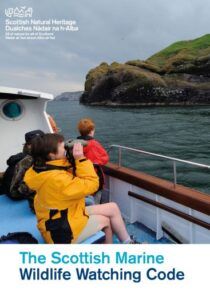
Summer is upon us, and for many that means heading to the coastline to catch a glimpse of some of the amazing wildlife Scotland’s beaches and seas play host to. Scotland’s coast is arguably the best place in Europe to see dolphins, porpoises and whales, attracting visitors around the world. Basking sharks – the second largest fish in the world – can also be seen in west coast waters in the summer months, as can magnificent seabird colonies, seals, otters, osprey and more.
(more…)
MPA monitoring strategy launch announced at second Sea Scotland conference
June 23rd, 2017 by emilie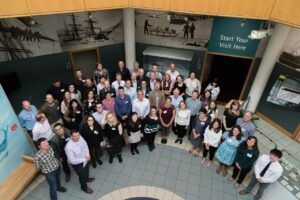 Hosted at the RRS Discovery Centre, Dundee, the second Sea Scotland conference drew together Scotland’s marine users, scientists, policy makers and more to share knowledge and discuss solutions to some of the greatest challenges and opportunities facing the sustainable management of Scotland’s marine area.
Hosted at the RRS Discovery Centre, Dundee, the second Sea Scotland conference drew together Scotland’s marine users, scientists, policy makers and more to share knowledge and discuss solutions to some of the greatest challenges and opportunities facing the sustainable management of Scotland’s marine area.
(more…)
Environmental Futures
June 8th, 2017 by nickUpcoming artists and graphic designers were asked to ‘picture’ a sustainable Scotland, and show Members of the Scottish Parliament what is needed to give Scotland a sustainable future at Scottish Environment week, a parliamentary event run by Scottish Environment LINK earlier this year. Four of these fantastic images focused on environmental challenges in the marine environment. To celebrate World Ocean’s Day we wanted to share these brilliant pieces of work.


